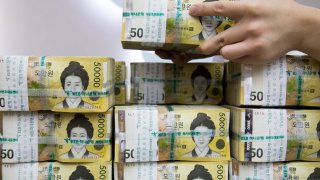
- South Korean finance minister Choo Kyung-ho says capital outflows do not take place on account of a single economic driver as investors are also swayed by other factors.
- Capital outflows occur when assets and money leave one country for another due to better investment returns, such as higher interest rates.
- Still, Choo acknowledged that the Fed's aggressive interest rate hikes is cause for concern as a growing difference in borrowing costs between the U.S. and South Korea could accelerate capital flows down the road.
BALI, Indonesia — South Korea's finance minister has shrugged off short-term risks of capital outflows from the Asian economy as gaps in global rates widen.
Speaking to CNBC at the Group of 20 meeting in Bali, Choo Kyung-ho said capital outflows from a country don't take place as a result of a single economic driver — such as interest rate gaps — since investors are also swayed by other factors, like the strength of an economy.
Get Boston local news, weather forecasts, lifestyle and entertainment stories to your inbox. Sign up for NBC Boston’s newsletters.
Choo, who is also the country's deputy prime minister, acknowledged there are concerns the U.S. may be headed for more aggressive rate hikes, and the widening rate gap could trigger capital outflows from South Korea.
"The rate gap has happened before a couple of times, but we didn't experience any major capital outflows," he said Friday, according to CNBC's translation. "Based on that, I think capital outflow doesn't happen simply because of a rate differential."
Capital outflows occur when assets and money leave one country for another due to better investment returns, such as higher interest rates.
Money Report
In June, the U.S. Federal Reserve increased benchmark interest rates by 75 basis points, its most aggressive rate hike since 1994.
The U.S. Federal Reserve is poised to make another major rate hike at its coming July meeting with some traders betting last week on an increase as high as 100 basis points, after U.S. consumer inflation hit a 40-year high of 9.1%.
Fundamentals are key
"The most important things are an economy's fundamentals, whether the economy can show reliability to markets. These are the factors that move capital," Choo told CNBC's Martin Soong.
However, the South Korean finance minister said the Fed's aggressive interest rate hikes — an attempt to rein in inflation — is still cause for concern. The growing difference in borrowing costs between the U.S. and South Korea could accelerate capital flows between the two countries down the road, he added.
Recent capital inflows into the South Korean economy, particularly into the treasury markets, have also helped mitigate concerns of an outward capital flight, Choo added.
"South Korea's economy is experiencing a smaller moderation compared to the global economy. And it is still on a recovery path," he said.
"That's why I am not worried about any dramatic capital outflows."
Last week, the Bank of Korea acknowledged there were risks of capital outflows when it delivered a historic half-point interest rate increase in a bid to rein in rising prices, as inflation soared to itsfastest pace in 24 years.
Concerns of capital outflows, or capital flight, are starting to emerge as central banks globally race to raise interest rates in an effort to curb rising inflation.
The disparity in rates between markets — especially with some markets like the U.S. favoring more aggressive rate hikes — can start to drive hot money flows as investors search for better returns.
Incidents of capital flight in the past include movements of money reacting to U.S. quantitative easing measures after the sub-prime crisis, which included increased liquidity and lower interest rates.
The weakening of the U.S. dollar forced capital into other markets such as emerging economies in Asia, raising inflationary pressures and appreciating the currencies in those markets.
Hot money outflows in Asia?
Economists have started to warn about this round of hot money flows.
Mizuho Bank analysts said in a note last week there were concerns of capital outflows from India, particularly as the U.S. is actively raising interest rates and weaknesses are appearing in India's economy.
India posted a record $25.6 billion trade deficit in June, as crude oil and coal imports surged.
"This will exacerbate volatile capital outflows, at a time when the US Fed is already committed to aggressive rate hikes, implying greater INR depreciation pressures," said analysts Vishnu Varathan, Lavanya Venkateswaran and Tan Boon Heng.
"The Reserve Bank of India, acutely aware of this predicament, is bracing for further rate hikes."
Thailand too may consider more rate hikes to keep up with Fed rate rises amid a depreciating Thai baht which "threatened to worsen imported inflation and exacerbate capital outflows in an adverse feedback loop", the analysts said.
The Chinese economy could also experience increased pressures in capital outflows as a result of U.S. rate hikes although China's own muted economy was the more likely driver for money flows, said Larry Hu, Macquarie Group's chief China economist, said in a note last month.






